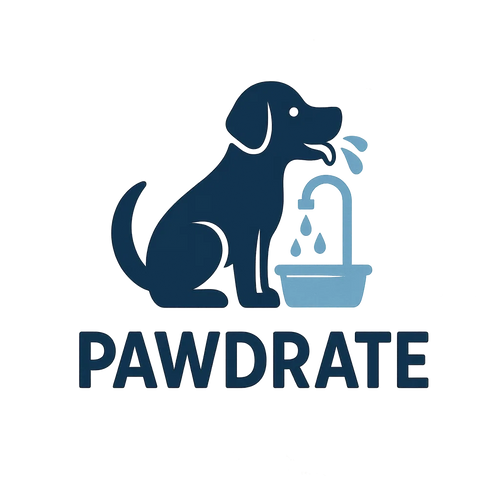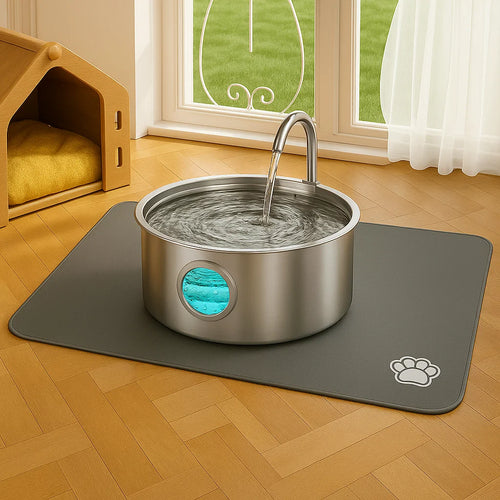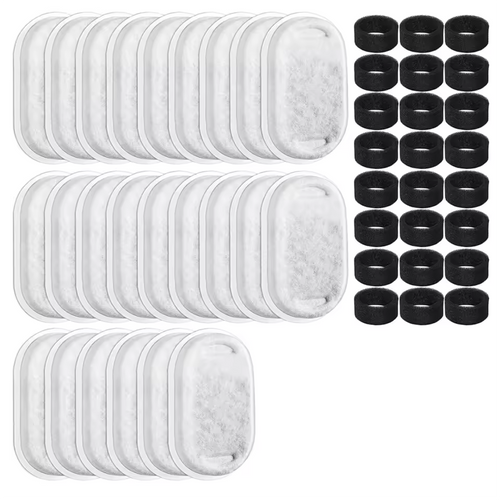The moment Dr. Chen said "kidney failure," my world stopped. My healthy, active 6-year-old Border Collie, Jasper, was in acute kidney failure. "But how?" I stammered. "He seemed fine last week." Her next words haunt me still: "Severe dehydration can trigger kidney failure surprisingly quickly. When did he last drink normally?" That's when it hit me—Jasper had been refusing water for three days after a stomach bug, and I'd assumed he'd drink when ready. I was wrong, and it nearly cost him his life.
If you're searching "can dehydration cause kidney failure in dogs," you're asking one of the most important questions in canine health. The answer is a resounding yes—and the connection is more direct and dangerous than most pet parents realize.
This guide will explain exactly how dehydration damages kidneys, why some dogs are at higher risk, and most importantly, how to protect your dog from this preventable tragedy.
The Stark Truth: Yes, Dehydration Can Cause Kidney Failure
Let's be clear from the start: dehydration is one of the leading causes of acute kidney injury in dogs, and chronic mild dehydration contributes significantly to chronic kidney disease. Here's why:
Your Dog's Kidneys: The Body's Filter System
Think of kidneys as sophisticated filtering plants that:
- Remove toxins and waste from blood
- Balance electrolytes and minerals
- Regulate blood pressure
- Produce hormones for red blood cell creation
- Maintain proper hydration levels
These fist-sized organs process your dog's entire blood supply every 30 minutes. They're remarkably efficient—until they're not.
How Dehydration Destroys Kidney Function
When your dog becomes dehydrated, a cascade of damage begins:
1. Reduced Blood Flow
- Less water = thicker blood
- Thicker blood = harder to pump
- Reduced flow = less oxygen to kidneys
- Kidney cells begin dying within hours
2. Toxin Concentration
- Same amount of waste in less fluid
- Kidneys work harder to filter concentrated toxins
- Overwork leads to cellular damage
- Filtering capacity decreases
3. Electrolyte Imbalance
- Dehydration disrupts sodium/potassium balance
- Abnormal levels damage kidney tubules
- Creates dangerous heart rhythms
- Further reduces kidney function
4. Inflammatory Response
- Dehydration triggers inflammation
- Inflammatory compounds damage kidney tissue
- Creates scar tissue (fibrosis)
- Permanent function loss
Types of Kidney Failure Caused by Dehydration
Acute Kidney Injury (AKI) - The Emergency
What happens:
- Sudden, severe dehydration
- Kidney function drops rapidly (hours to days)
- Often reversible if caught early
- Can be fatal without treatment
Common triggers:
- Severe vomiting/diarrhea
- Heat stroke
- Being trapped without water
- Post-surgery complications
- Excessive exercise without hydration
Jasper's story: His three days of refusing water after stomach upset caused acute kidney injury. With aggressive IV fluids and supportive care, we were lucky—his kidneys recovered about 80% function.
Chronic Kidney Disease (CKD) - The Silent Killer
What happens:
- Years of mild dehydration
- Gradual, irreversible damage
- Often unnoticed until 75% function lost
- Progressive and ultimately fatal
How chronic dehydration causes CKD:
- Daily mild dehydration = daily kidney stress
- Microscopic damage accumulates
- Healthy tissue slowly replaced by scar tissue
- Function declines year by year
The terrifying part: Dogs can lose most kidney function before showing symptoms.
The Dehydration-Kidney Failure Timeline
Understanding how quickly dehydration can damage kidneys is crucial:
Hour 1-6: Early Dehydration
- Mild reduction in kidney blood flow
- Kidneys compensate by concentrating urine
- No permanent damage yet
- Easily reversible
Hour 6-24: Moderate Dehydration
- Significant reduction in kidney perfusion
- Waste products begin accumulating
- Early cellular stress
- Still reversible with prompt treatment
Day 1-3: Severe Dehydration
- Kidney cells begin dying
- Acute tubular necrosis starts
- BUN and creatinine levels rising
- Permanent damage possible
Day 3+: Critical Dehydration
- Extensive kidney damage
- Multiple organ involvement
- Life-threatening complications
- Permanent function loss likely
The window for preventing permanent damage is frighteningly short.
Which Dogs Face the Highest Risk?
While any dog can develop kidney failure from dehydration, some face elevated risk:
Age-Related Risk
Puppies (Under 6 months):
- Immature kidneys more vulnerable
- Dehydrate faster due to size
- Less reserve capacity
Senior Dogs (7+ years):
- Already declining kidney function
- Less able to concentrate urine
- Often have concurrent conditions
- May not feel thirsty
Breed Predispositions
Some breeds have genetic kidney vulnerabilities:
- Cocker Spaniels (familial nephropathy)
- Bull Terriers (polycystic kidney disease)
- German Shepherds (renal cystadenocarcinoma)
- Shih Tzus (renal dysplasia)
- Samoyeds (hereditary glomerulopathy)
These breeds need extra vigilance against dehydration.
Health Conditions That Increase Risk
Diabetes:
- Already stressing kidneys
- Glucose in urine increases water loss
- More prone to dehydration
Heart Disease:
- Medications may affect kidney function
- Reduced cardiac output affects kidneys
- Fluid balance already compromised
Previous Kidney Issues:
- Any past kidney injury increases vulnerability
- Less functional reserve
- More sensitive to dehydration
Chronic UTIs:
- Ongoing inflammation
- Repeated antibiotic use
- Kidney infection risk
Early Warning Signs: When Dehydration Threatens Kidneys
Recognizing these signs could save your dog's life:
Stage 1: Dehydration Beginning
- Increased thirst (or paradoxically, refusing water)
- Dry, sticky gums
- Lethargy
- Decreased urination
- Dark yellow urine
Stage 2: Kidneys Under Stress
- Significant lethargy
- Loss of appetite
- Vomiting
- Straining to urinate
- Bad breath (early uremia)
Stage 3: Kidney Damage Occurring
- Complete appetite loss
- Persistent vomiting
- Extreme weakness
- Little to no urination
- Ammonia breath odor
Stage 4: Kidney Failure
- Seizures
- Unconsciousness
- No urine production
- Hypothermia
- Death within hours without treatment
Real Cases: When Dehydration Led to Kidney Failure
Case 1: The Weekend Warrior
Max, a 4-year-old Labrador, spent Saturday hiking with his family. Despite the 90°F heat, he only had access to water at the start and end of the 6-hour hike. By Sunday, he was in acute kidney failure. Cost: $4,000 in emergency treatment. Outcome: 60% kidney function recovered.
Case 2: The Senior Who "Wasn't Thirsty"
Belle, a 12-year-old Poodle, gradually drank less over months. Her owners assumed it was "normal aging." Annual bloodwork revealed stage 3 chronic kidney disease from chronic dehydration. Outcome: Management, not cure.
Case 3: The Post-Surgery Tragedy
Cooper, a 7-year-old Beagle, refused water after dental surgery. His owners waited 48 hours before concerning themselves. Acute kidney injury resulted. Outcome: Did not survive.
These aren't rare cases—they happen every day in veterinary hospitals.
The Science: How Dehydration Damages Kidneys at the Cellular Level
For those wanting deeper understanding:
Ischemic Injury
- Reduced blood flow starves cells of oxygen
- ATP (cellular energy) production stops
- Cell membranes break down
- Cellular contents leak, causing inflammation
Oxidative Stress
- Dehydration increases free radical production
- Antioxidant systems overwhelmed
- DNA damage occurs
- Cells trigger programmed death
Tubular Obstruction
- Dead cells slough off into tubules
- Form casts that block urine flow
- Back-pressure damages more cells
- Vicious cycle ensues
Inflammatory Cascade
- Damaged cells release cytokines
- Attracts inflammatory cells
- Further tissue destruction
- Scarring begins
Prevention: Your Action Plan to Protect Your Dog's Kidneys
Daily Hydration Strategies
Ensure Constant Access:
- Multiple water stations throughout home
- Fresh water changed twice daily
- Clean bowls (bacteria discourage drinking)
- Consider flowing water if preferred
Monitor Intake:
- Know your dog's normal consumption
- Track changes in drinking habits
- Watch urine color and frequency
- Act on any decreases immediately
Make Water Appealing:
- Add low-sodium broth occasionally
- Use ice cubes as treats
- Provide running water option
- Optimal temperature (cool, not cold)
Special Situation Protocols
Hot Weather:
- Increase water stations
- Add electrolyte supplements if active
- Limit exercise to cool hours
- Never leave without water access
- Bring water on all outings
Illness:
- Offer water hourly
- Use syringes if needed (with vet guidance)
- Consider subcutaneous fluids
- Monitor closely for dehydration signs
- Don't wait—seek help early
Travel:
- Stop every 2 hours for water
- Bring familiar water bowl
- Account for stress-reduced drinking
- Plan water access at destination
Post-Surgery:
- Follow vet hydration instructions exactly
- Monitor intake carefully
- Report any refusal to drink
- Don't assume they'll "drink when ready"
Know Your Dog's Risk Factors
Create a risk profile:
- Age
- Breed
- Health conditions
- Medications
- Activity level
- Drinking habits
Higher risk = more vigilant monitoring needed.
Emergency Response: What to Do If You Suspect Kidney Problems
Immediate Actions:
- Do NOT force large amounts of water (can cause vomiting)
- Offer small amounts frequently
- Check gums for moisture and color
- Note last urination
- Call vet immediately
What Your Vet Needs to Know:
- How long since normal water intake
- Last urination time and amount
- Any vomiting/diarrhea
- Recent activities or illness
- Current medications
- Gum color and moisture
Treatment Options:
- IV fluid therapy (gold standard)
- Subcutaneous fluids
- Anti-nausea medications
- Kidney function blood tests
- Urinalysis
- Ultrasound if needed
- Hospitalization for severe cases
Long-Term Kidney Protection Strategies
Annual Screening
- Blood work (BUN, creatinine, SDMA)
- Urinalysis
- Blood pressure check
- Earlier for at-risk dogs
Diet Considerations
- High-quality protein
- Controlled phosphorus
- Adequate moisture content
- Avoid excessive sodium
Lifestyle Modifications
- Consistent hydration routine
- Regular moderate exercise
- Stress reduction
- Weight management
Supplements (Vet-Approved)
- Omega-3 fatty acids
- Antioxidants
- B vitamins
- Probiotics
The Financial Reality
Understanding costs motivates prevention:
Acute Kidney Injury Treatment:
- Emergency exam: $150-300
- IV fluids (24-48 hours): $800-2000
- Blood work: $200-400
- Hospitalization: $500-1500/day
- Total: $2,000-8,000
Chronic Kidney Disease Management:
- Monthly blood work: $150-300
- Special diet: $80-150/month
- Medications: $50-200/month
- Subcutaneous fluids: $30-50/week
- Annual cost: $3,000-8,000
Prevention Cost:
- Quality water fountain: $70-120
- Annual blood work: $200-300
- Total: Under $500
The Bottom Line: Dehydration Is a Kidney Killer
The connection between dehydration and kidney failure isn't theoretical—it's a daily reality in veterinary hospitals. Every day, dogs suffer permanent kidney damage from something entirely preventable: inadequate water intake.
Jasper survived his acute kidney injury, but he lost 20% of his kidney function forever. That three days of dehydration will affect him for the rest of his life. We now have multiple water sources, including a flowing fountain he can't resist, and I monitor his intake religiously.
Don't wait for a crisis to take hydration seriously. Your dog's kidneys are working hard every minute of every day. The least we can do is ensure they have the water they need to do their job.
To help your dog stay hydrated and healthy, check out the Pawdrate™ Filtered Water Fountain—designed to encourage natural drinking behavior with fresh, flowing water that dogs instinctively prefer.





